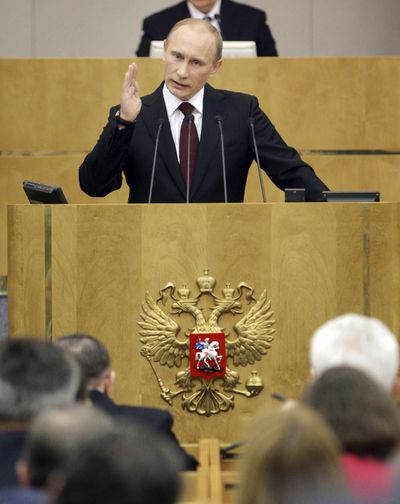Putin speech signals aspirations for 2012
Premier likely to seek presidency again

MOSCOW – Vladimir Putin has given Russia’s farmers, blue-collar workers, soldiers, parents and retirees good reasons to want him back in the Kremlin.
In a four-hour nationally televised appearance, the prime minister said not a word Wednesday about his plans for next year’s presidential election. The topic has been a subject of fervent debate in recent weeks as President Dmitry Medvedev has shown a desire to stay on for another term.
But by portraying himself as the defender of a strong Russia and making a string of campaign-like promises to improve the lives of ordinary people, Putin sent a signal that he intends to reclaim the presidency.
“The nation needs decades of stable and calm development without any sharp movements and ill-conceived experiments” based on liberal policy, the 58-year-old leader said during his annual address before parliament.
Putin, Russia’s president from 2000 to 2008, was barred by the constitution from serving a third consecutive term and groomed Medvedev to succeed him. Both men have said they will decide together which one of them will run in March 2012, but the decision is understood to be Putin’s.
The uncertainty seems to suit both of them. The debate over which one will run serves to stimulate interest in the presidential election by creating a pretense of political competition.
The uncertainty, which leaves open the possibility that Medvedev will remain in the Kremlin, also helps him carry out the mission that Putin set for him and encourages those in the West who have worked to improve relations with Russia.
Putin chose the tech-savvy Medvedev, 13 years his junior, to lead the drive to modernize the Russian economy, still based largely on exports of oil and gas, and to tackle spiraling corruption. Medvedev also presents a friendlier face to the West, as Russia seeks to attract much-needed foreign investment.
Medvedev’s liberal pronouncements have helped to bring back on board the business community and educated urban elite, who had become disillusioned with Putin as he established greater state control over the economy and politics. Even though Medvedev has brought little real change, his presence gives hope to those who want to see a more democratic Russia.
Putin remains the more popular leader. His tough language and anti-Western tone plays well with most of his countrymen, who see him as the defender of Russia’s great-power status and the guarantor of their security and future prosperity.
Putin on Wednesday took credit for Russia’s rapid emergence from the global financial crisis.
“In the modern world, if you are weak, there will always be someone who wants to come in or fly in to give you advice as to which direction to take, what policy to conduct, what path to choose for your own development,” he said. “And behind such seemingly well-meaning and unobtrusive advice, which could seem good, in fact stands a rough diktat and interference into the domestic affairs of sovereign states.”
The key lesson from the financial crisis, he said, was for Russia to be self-reliant and strong enough to resist outside pressure.
Putin said Russia’s economy grew 4 percent last year and would reach pre-crisis levels by 2012. He promised that Russia, now the world’s sixth-largest economy, would move into the top five by 2020.